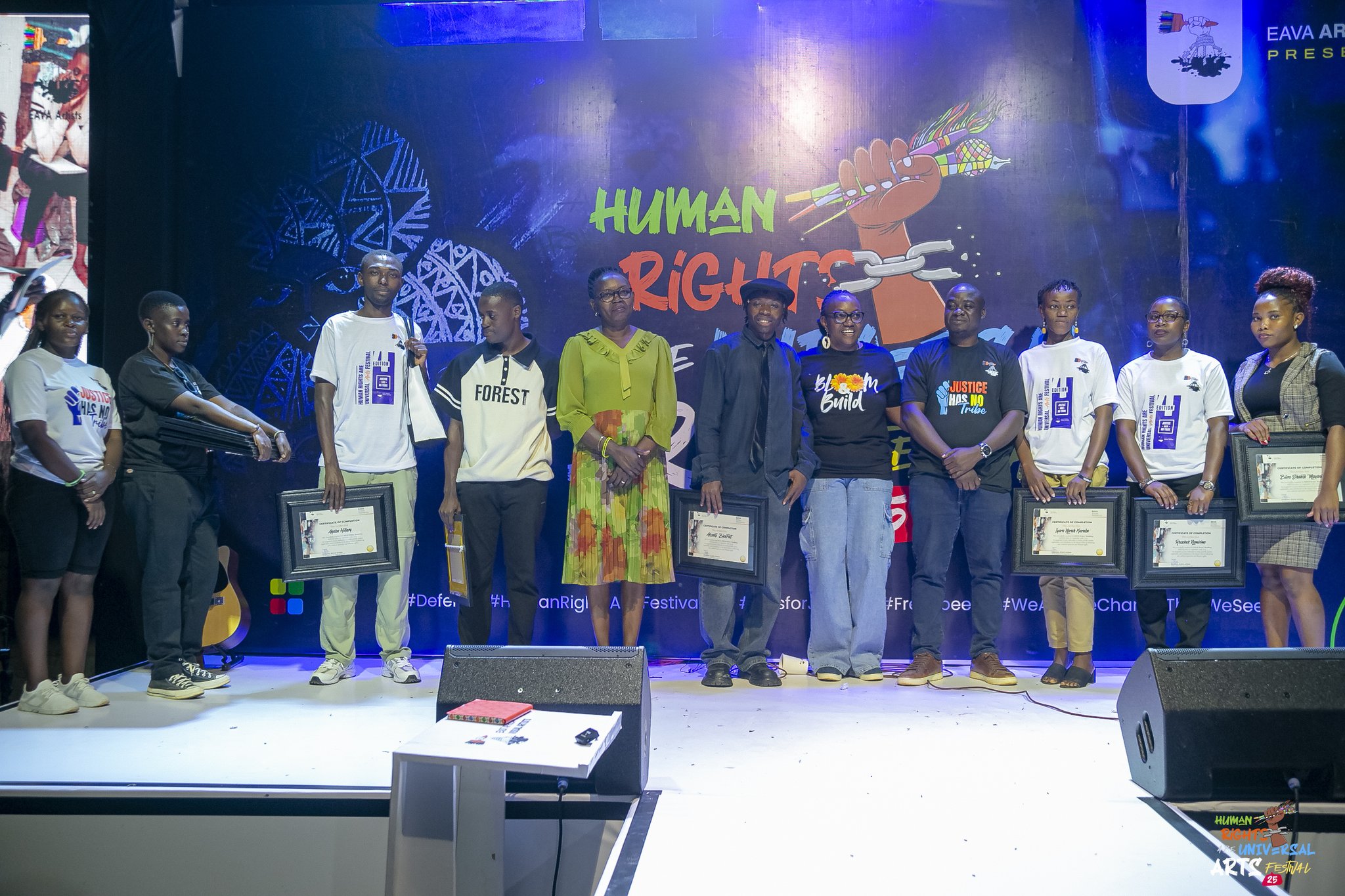
 Time FM
Time FM

 Time FM
Time FM
28 October 2025, 10:01 am
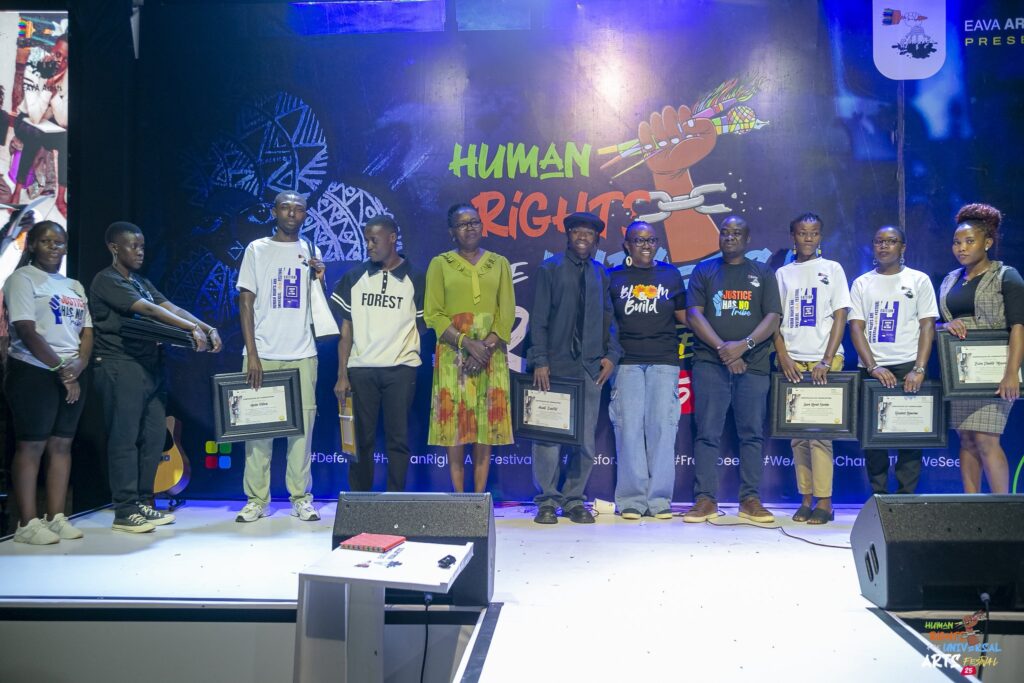
By Shadrach Bethel Afayo
As Uganda marked 63 years of independence on October 9th, a different kind of celebration unfolded at the heart of Kampala — one steeped in music, poetry, painting, and advocacy.
The East African Visual Artists (EAVA) collective hosted a four-day celebration titled “Human Rights Are Universal Arts Festival,” running from October 9th to 12th under the theme “Defend.” The festival brought together artists, activists, musicians, poets, and vendors, transforming art into a language of justice, solidarity, and civic reflection.
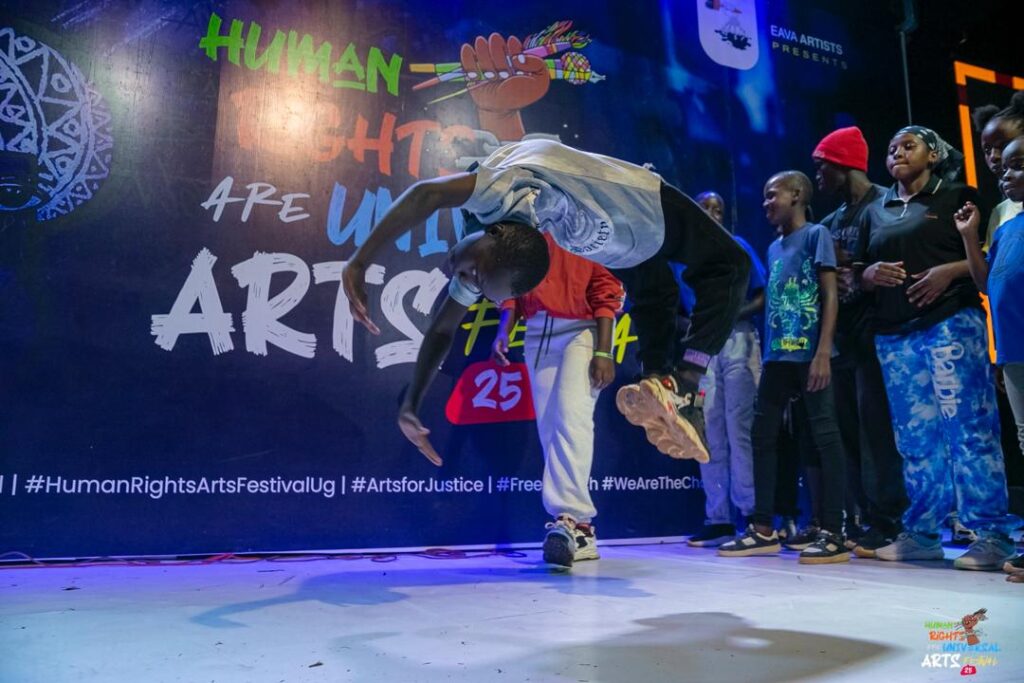
From its opening performances to the closing discussions, the festival merged creative expression and human rights advocacy, reminding citizens that independence is not merely political sovereignty but the ongoing fight for dignity, equality, and freedom.
The festival opened with an evocative performance by Ephraim and Edwardo Kayondo, whose moving rendition of “Mirembe” — a song dedicated to refugees and victims of war — set the tone for the days ahead.
Their harmonies carried the ache and hope of people displaced by conflict, a theme that resonates deeply in a region marked by both resilience and recurring turmoil.
Opening remarks came from Mr. Kyabayinze Vincent, Director of the East African Visual Artists, who underscored the power of art as both a mirror and a map — reflecting society’s truths and envisioning its future.
“Without art we can’t envision the future, and if we can’t envision the future, it means we can’t solve the challenges we face,” he said, his words met with applause from a crowd of artists and rights advocates.
Kyabayinze urged the audience to use the festival not only as a space for expression but as a mirror for self-accountability.
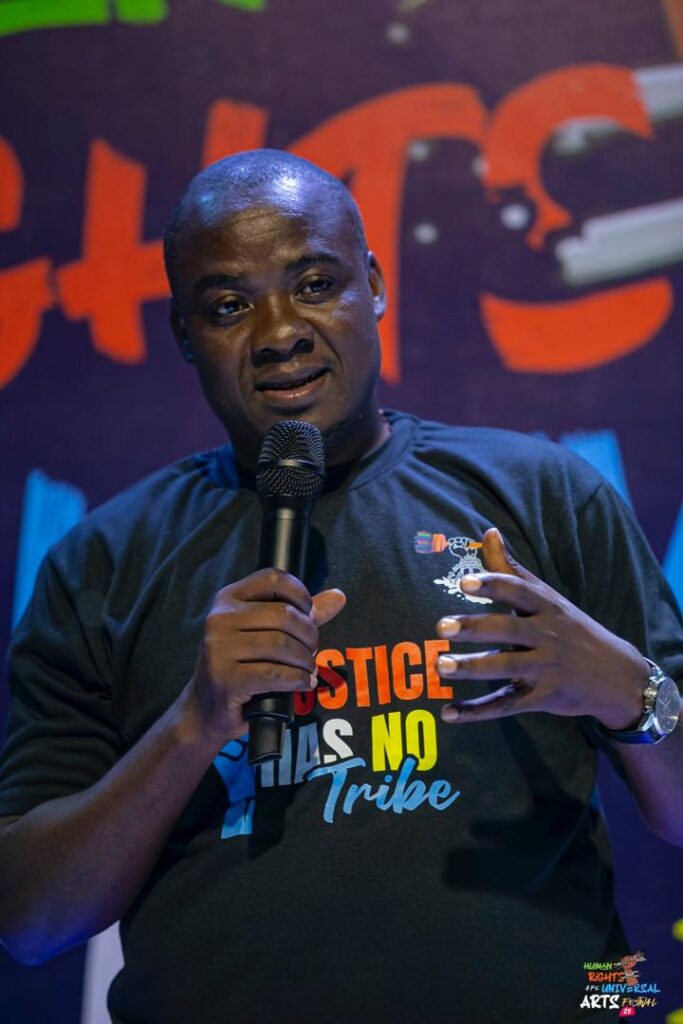
“We all have demands, but what do we demand for ourselves?” he asked. “We all love a clean city, but we litter it. We love respect yet fail to show it. It’s time to reflect.”
His reflection set the festival’s tone — a blend of introspection and action — as participants explored how art can defend freedoms and foster social responsibility.
Before the festival even began, the EAVA artist residency had been laying the groundwork for months. Conducted over a six-month period, the residency brought together a group of emerging artists who immersed themselves in mentorship, collaboration, and experimentation.
Their graduation was marked during the festival, where they showcased the works developed during their residency — vivid pieces reflecting themes of identity, justice, and resilience.
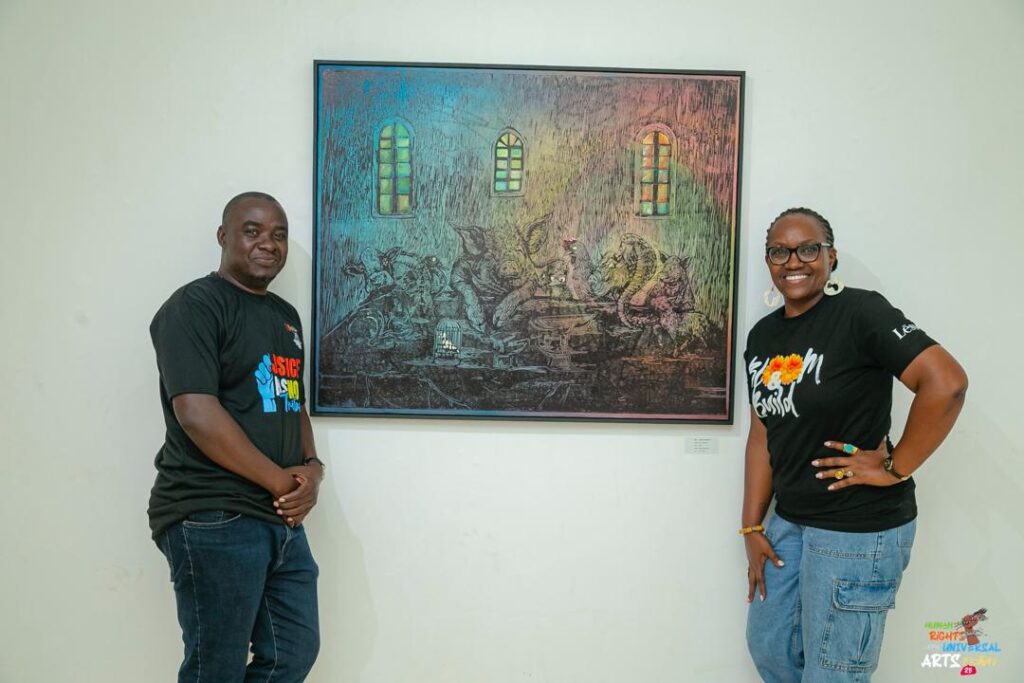
Alongside professional artists, the festival also created space for children’s dance and painting sessions, nurturing early expression through creativity. These activities — guided by local instructors and volunteers — emphasised that the freedom to create is as vital to children as it is to adults.
The young participants expressed their views on peace, environment, and equality through color, rhythm, and movement, embodying the idea that the defense of rights begins with awareness and imagination.
The timing of the festival — coinciding with Uganda’s independence anniversary — was perfect. While the nation celebrates six decades of self-rule, its human rights landscape remains marked by contradictions.
According to Freedom House’s 2025 report, Uganda scores 34 out of 100 on civil and political freedoms, categorising it as “Not Free.” The country’s Freedom on the Net rating stands at 53/100, reflecting partial freedom but persistent challenges in online expression, surveillance, and restrictions on dissent.
Uganda’s Constitution (1995) guarantees fundamental rights — freedom of expression, assembly, equality, and protection from discrimination — yet the lived experience for many Ugandans tells a different story.
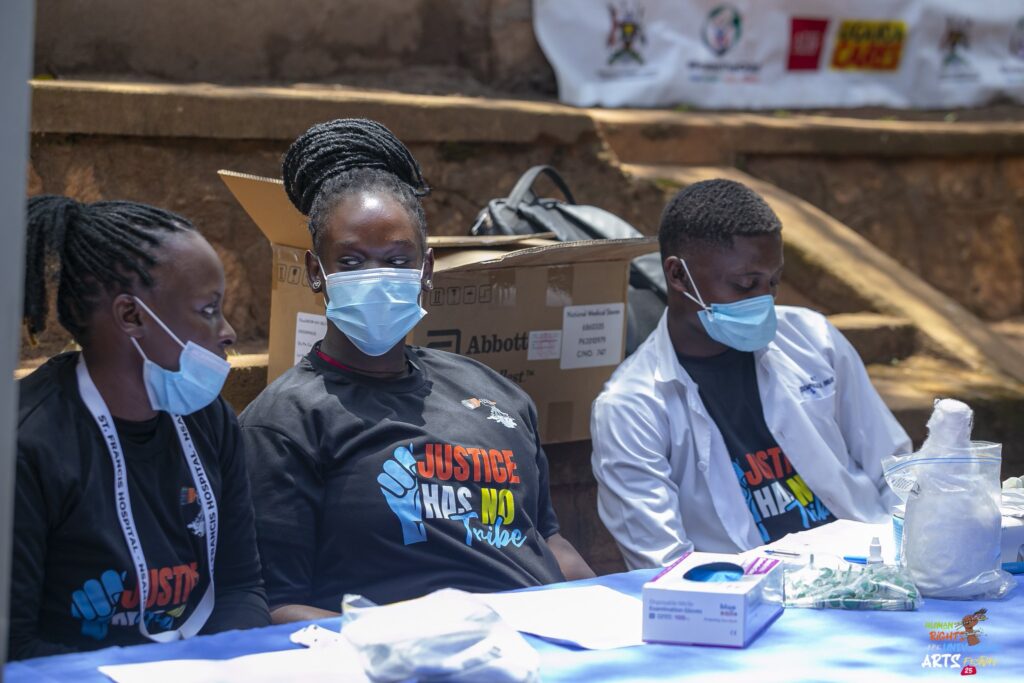
Recent years have seen crackdowns on journalists, restrictions on civil society organisations, and the enactment of controversial legislation, such as the Anti-Homosexuality Act (2023), which drew global condemnation for criminalising same-sex relations and threatening harsh penalties, including life imprisonment.
In April 2024, parts of the law were struck down by the Constitutional Court, but its core remains — underscoring the tension between morality-driven politics and constitutional rights.Uganda also continues to struggle with press freedom violations, arbitrary arrests, and delays in justice.
In its 27th Annual Report (2024), the Uganda Human Rights Commission (UHRC) cited persistent challenges, including overcrowded prisons, cases of torture, and attacks on journalists. Against this backdrop, the festival’s theme — “Defend” — served as both a challenge and a call to action.
Representing UHRC Chairperson Mariam Wangadya, Hon. Sarah Nakhumista, the Commission’s Director of Regional Operations, lauded the festival as a vital platform for inclusive dialogue and awareness.
“The theme ‘Defend’ reflects inclusive participation,” she said. “The universality of human rights is the cornerstone of human dignity.”
Nakhumista emphasised that government efforts toward human rights promotion have gained traction in recent years. “We now have several ministries and agencies with human rights departments,” she noted, pointing to ongoing work in civic education and the establishment of rights-based approaches within the security and justice sectors.
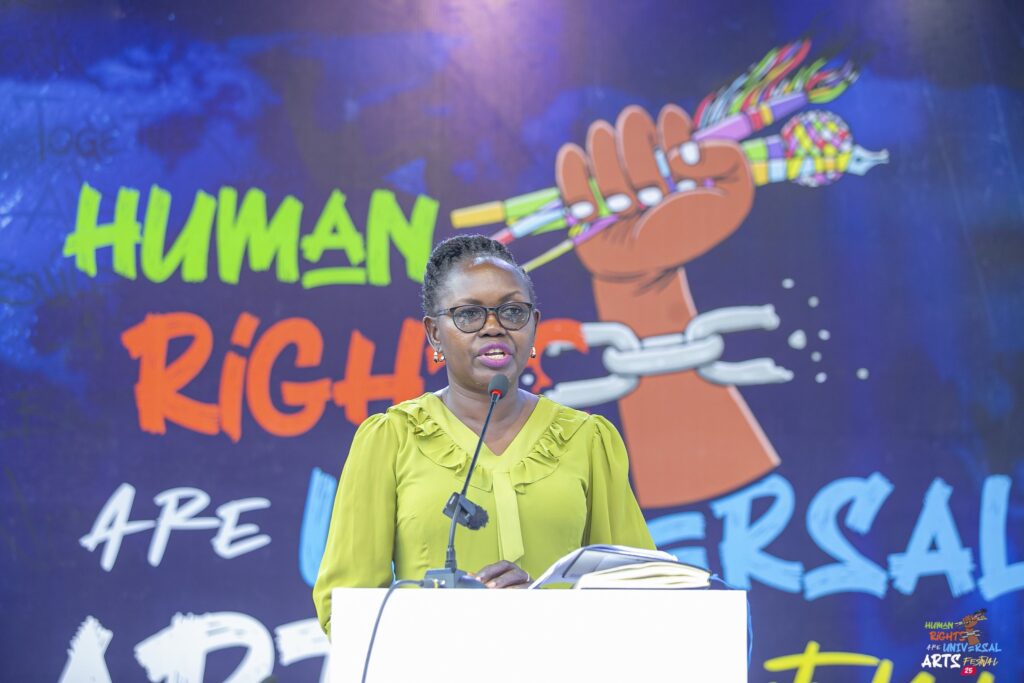
She further highlighted the National Civic Education Plan, designed to help citizens know, claim, and demand their rights while reminding duty bearers of their obligations.
However, she acknowledged lingering shortfalls. “We have made progress, but challenges remain,” Nakhumista admitted. “There have been attacks on journalists, and while we urge accountability, journalists too must tackle misinformation and disinformation responsibly.”
She cited overcrowded prisons and the trial of civilians in military courts as key human rights concerns requiring urgent reform.
Panels on art, accountability, and culture
Throughout the four days, panel discussions remained the festival’s intellectual core — an ongoing dialogue that ran parallel to exhibitions and performances. Each day offered fresh debates and perspectives, keeping the energy of exchange alive from morning sessions to twilight reflections.
The first panel, moderated by Lawyer and Feminist Elizabeth Kemigisha, brought together Anthony Natif, Dr. Dominique Dipio, and High Court Advocate Godiva Akullo. Their conversation focused on how art can drive accountability, helping citizens hold duty bearers to their promises.
“Art provokes memory and moral conscience,” noted Dr. Dipio. “It captures what policy often forgets — the humanity behind the numbers.”
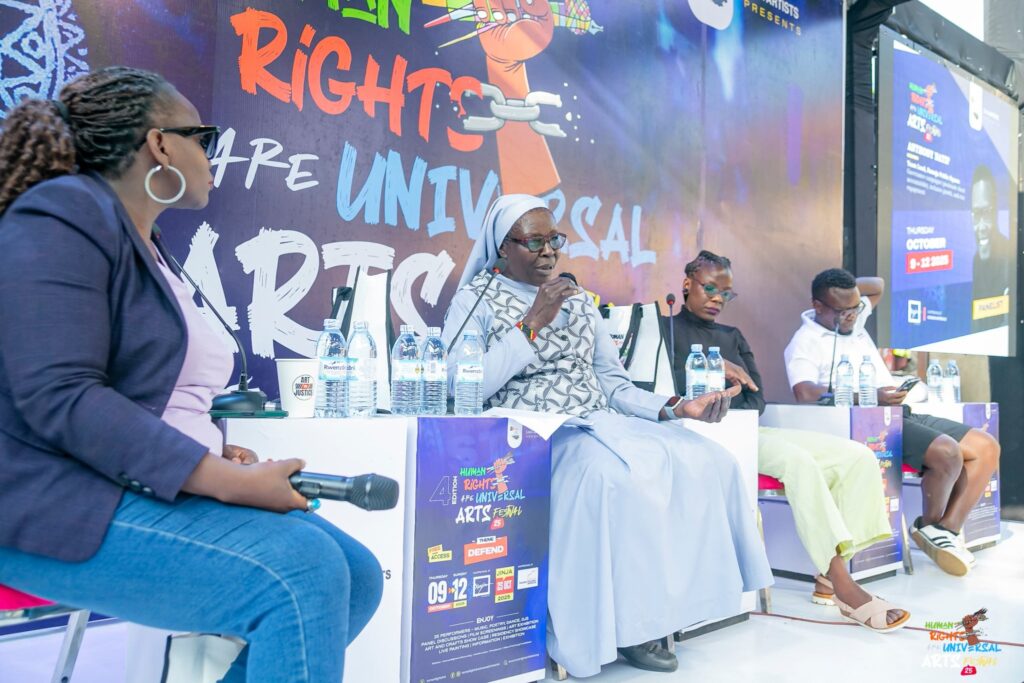
Godiva Akullo, a prominent legal advocate, argued that creativity and activism are deeply intertwined: “If art reflects society, then it must also reflect injustice. To defend rights is to defend truth.”
A second panel, moderated by journalist Andrew Kaggwa, featured performer and cultural elder Ssenoga Tamuzade, visual artist Matt Kayem, and creative arts consultant Owek. Nuwa Wamala Nnyanzi.
The conversation explored the relationship between culture, art, and preservation — how creative expression can sustain heritage while nurturing modern identity.Panelists agreed that art must do more than entertain; it must inform, educate, and preserve. “Culture gives us identity, but art gives it voice,” said Nnyanzi, to nods from the audience.
Other sessions examined gender equity, freedom of expression in the digital era, and the economics of creative resistance — ensuring that each day deepened the public’s understanding of art’s role in defending human rights.
Art, activism, and healing
Beyond the panels and performances, the festival grounds were alive with vibrant exhibitions, poetry slams, street art, and vendor stalls. Dozens of small-scale entrepreneurs displayed local crafts, books, and handmade jewelry.
Families, students, and art lovers mingled freely — some trying their hands at open painting corners or joining spontaneous drum circles and dance sessions that kept the mood alive. The fun, interactive atmosphere reminded everyone that activism can also be joyful and communal.
Medical tents offered free HIV testing, counseling, and mental health services, bridging art with health and welfare.
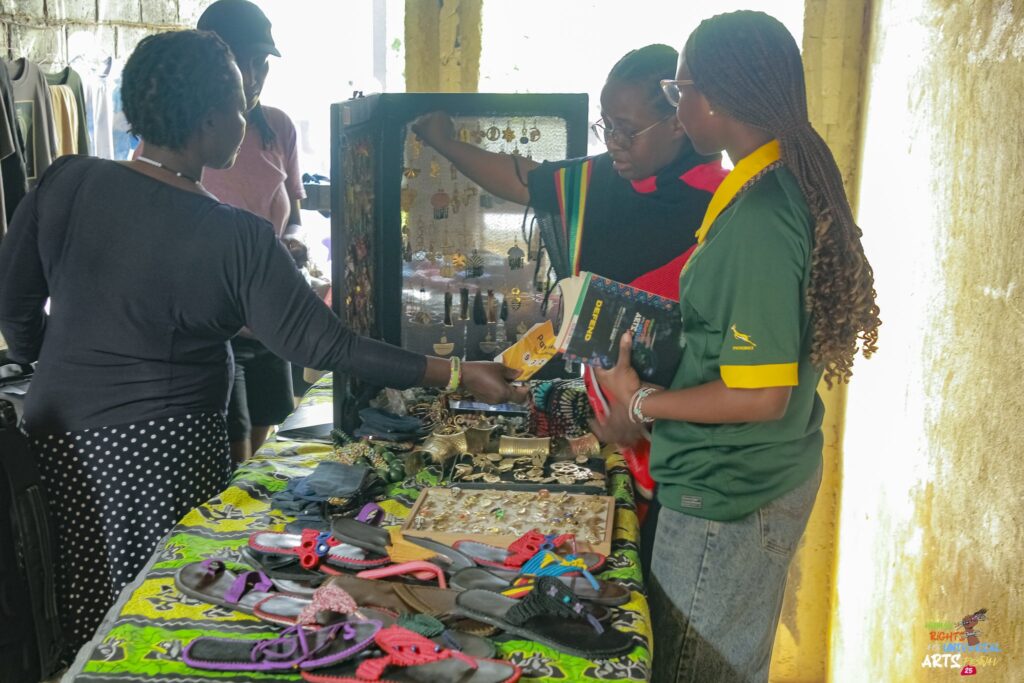
The festival’s closing night turned into a kaleidoscope of music and reflection — artists merging entertainment with messages of peace and equality.
“Our vendors brought life, color, and flavor to the festival,” said one of the organisers in closing remarks. “Thank you to everyone who stopped by, supported, and showed love — you made a difference.”
By its fourth day, the “Human Rights Are Universal Arts Festival” had become more than a celebration — it was a statement. Each painting, song, and panel spoke to the tension between aspiration and reality, between laws written and lives lived.
At a time when Uganda grapples with restrictive bills, digital surveillance, and shrinking civic space, the festival asserted a simple truth: art can still defend what politics neglects.
As independence celebrations faded into the night, one message lingered — that defending rights is not the work of governments alone. It belongs to everyone.
“Defend,” said Mr. Kyabayinze, as he closed the final session, “means taking responsibility — not just for the freedoms we enjoy, but for those still fighting to be seen.”